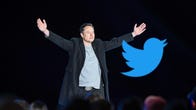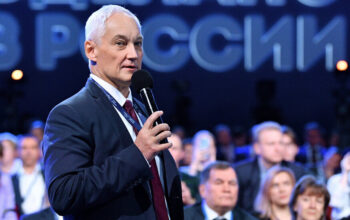Billionaire Elon Musk said Friday he was putting a $44 billion deal to buy Twitter “temporarily on hold” because he wants more details about how many of the social media site’s accounts are fake or spam.
Musk, who struck a deal in April to acquire the influential social network he uses to communicate with his nearly 93 million followers, cited a Reuters article from May that cited a securities filing that said less than 5% of Twitter’s 229 million daily users who saw ads were fake accounts in the first quarter of this year.
Twitter deal temporarily on hold pending details supporting calculation that spam/fake accounts do indeed represent less than 5% of usershttps://t.co/Y2t0QMuuyn
— Elon Musk (@elonmusk) May 13, 2022
“Still committed to acquisition,” Musk tweeted. Twitter’s stock dropped 8% to $41.16 per share on Friday.
Toni Sacconaghi, a senior research analyst at Bernstein, told CNBC that the pause could be “negotiation tactic” to get Twitter to lower its sale price because the company’s stock price has been falling.
On April 25, Twitter said Musk had agreed to buy the company at a price of $54.20 per share in cash. The deal represents a 38% premium to Twitter’s closing stock price on April 1, when the entrepreneur, who runs Tesla, SpaceX and other companies, revealed he owns more than 9% of Twitter. If the deal closes, Twitter will be taken private, ending its run as a publicly traded company.
The deal capped off what has become a roller coaster relationship between the tech mogul and Twitter. Though Musk is one of the social media company’s largest shareholders, he then turned down a seat on Twitter’s board of directors and decided to try to buy the whole company. Initially hesitant, the board came around after Musk secured more than $46 billion in cash and equity to pay for the deal. Twitter shareholders still need to approve the deal, which isn’t expected to close for six months.
Since then, Musk has been busy. Over the past week, he sold $8.5 billion in Tesla shares, presumably to raise cash for his big purchase. On April 28, Musk tweeted: “No further TSLA sales planned after today.” Musk is reportedly talking to investment firms and high net-worth people about taking up more financing for the acquisition so less of his wealth gets tied up in the deal, Reuters reported on May 2, citing anonymous sources.
Here’s what you need to know about the ongoing drama between Twitter and Musk:
Why does Musk want to buy Twitter?
Musk is an avid user of the service but also one of its loudest critics.
Musk tweeted a poll to his followers in March that asked whether users believed Twitter was protecting free speech. He said the poll results, in which roughly 70% of 2 million respondents answered “no,” would be “very important.”
“Given that Twitter serves as the de facto public town square, failing to adhere to free speech principles fundamentally undermines democracy. What should be done?” Musk said in a follow-up tweet. Then he made an offer to buy Twitter, noting that he believed Twitter needed to be private to accomplish his goal.
The guarantee of free speech in the US Constitution’s First Amendment applies to the government censoring speech but not to companies such as Twitter, which have their own rules about what isn’t allowed on their sites.
Musk referenced free speech again when the agreement was made public. He also said he wanted to enhance Twitter with new features and promised he would make the service’s algorithms open source, defeat spam bots and authenticate all humans.
“Twitter has tremendous potential,” Musk wrote. “I look forward to working with the company and the community of users to unlock it.”
Progressives have criticized social media companies for failing to crack down on harmful content such as hate speech and harassment. Conservatives claim their speech is being censored. (Twitter has long denied allegations it censors conservatives.)
On April 19, Musk tweeted he thinks social media policies “are good if the most extreme 10% on left and right are equally unhappy.”
What has Twitter’s response been?
Initially, it seemed like Twitter was going to turn down the offer but the board started to take it more seriously when Musk offered details about how he would finance the deal. The company had adopted a defensive strategy known as the “poison pill” that would make it tougher for Musk to add to his stake in the company. The tactic allowed Twitter to accept a competing offer, if one emerged.
Twitter co-founder Jack Dorsey tweeted on April 15 that “as a public company, twitter has always been ‘for sale.’ that’s the real issue.” Twitter has dealt with leadership changes, layoffs and activist investors as a public company. After Twitter announced the deal, Dorsey said he didn’t believe that anyone should own or run Twitter but taking it back from Wall Street is the “correct first step.”
The idea and service is all that matters to me, and I will do whatever it takes to protect both. Twitter as a company has always been my sole issue and my biggest regret. It has been owned by Wall Street and the ad model. Taking it back from Wall Street is the correct first step.
— jack⚡️ (@jack) April 26, 2022
“Solving for the problem of it being a company however, Elon is the singular solution I trust,” Dorsey tweeted. “I trust his mission to extend the light of consciousness.”
How would Musk pay for Twitter?
Musk is reportedly the richest person in the world, with a net worth of $251 billion.
In an SEC filing on April 20, Musk said he had secured about $25.5 billion in debt financing through Morgan Stanley and other financial institutions. Musk said he had personally committed about $21 billion in equity financing
What happens next?
The deal still needs to be approved by shareholders, and there’s speculation that Musk could back out. Terminating the deal, though, would cost Musk $1 billion because of a termination fee that’s part of the agreement, according an SEC filing on April 25.
The takeover attempt will likely lead to more leadership changes within Twitter. Musk is expected to serve as temporary CEO after the deal closes, CNBC reported. Parag Agrawal, who took over from co-founder Jack Dorsey in November, is expected to stay until the sale is completed. Musk also said he’d rein in executive and board pay, in addition to figuring out new ways to make money, according to Reuters, which cited anonymous sources. This week, two longtime Twitter executives said the CEO asked them to leave their jobs.
Bloomberg reported that the entrepreneur had suggested job cuts as he pitched the deal. He also reportedly told banks that Twitter needed to get influencers and celebrities more active on the platform.



